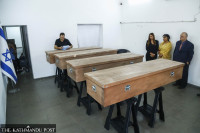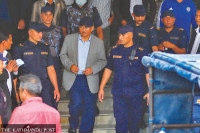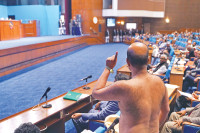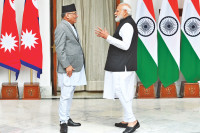Special Supplement
Theatre reborn
Women in Nepal have been harassed and abused but how often is that we see the stories of women, as experienced by women, brought to the fore of the cultural dialogue by films, theatre or the media?” asks Gunjan Dixit, theatre practioner and the co-founder of Katha Ghera, a theatre group.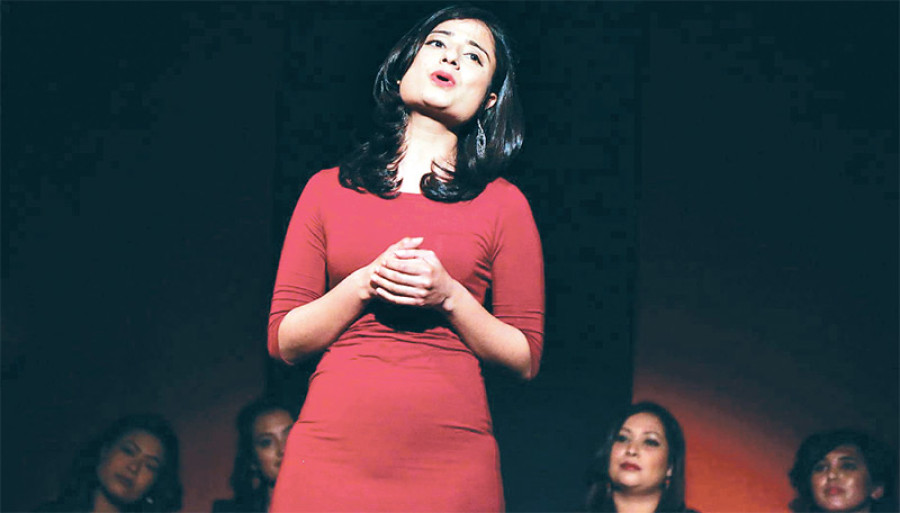
Timothy Aryal
Women in Nepal have been harassed and abused but how often is that we see the stories of women, as experienced by women, brought to the fore of the cultural dialogue by films, theatre or the media?” asks Gunjan Dixit, theatre practioner and the co-founder of Katha Ghera, a theatre group.
In March this year, Gunjan along with Akanchha Karki, another co-founder of Katha Ghera, co-directed the second edition of Yoni ka Katha Haru, the Nepali translation of Eve Ensler’s The Vagina Monologues. After which, in November, group produced a Nepali adaptation of Israel Horovitz’s Line, which had Karki as director and Dixit as the production manager, and which according to one reviewer, “may well prove to be a landmark in Nepali theatre when it comes to adaptation of dialogue and context.”
Nepali theatre, as for most segments of the Nepali society, is dominated by the male voice, but in spite of this historical dominance, new crop of actors and directors like Gunjan have emerged as innovators who do not hesitate to experiment with the art form. After a month-long staging of Line, Katha Ghera returned to stage by picking up another episode of Playback Theatre, an improvisational form of theatre where the actors (or the play backers, as they are called) reenact or reciprocate the stories as narrated by the audience on the spot.
Popularised by Jonathan Fox (who, incidentally, also served as a Peace Corps volunteer in Nepal) and Jo Salas in the mid 70s, the form was adapted by a handful of NGOs and INGOs in the wake of the Maoist insurgency, but the format was never cemented in Nepal’s burgeoning theatre scene.
Spearheaded by Katha Ghera, the first show of Playback Theatre after the conclusion of Line took place at the Evoke Café in Jhamsikhel, where the group—comprising of Akanchha Karki as conductor; Dixit, Som Nath Khanal, Binita Gurung, Ingi Hopo Koinch Sunuwar, Nisha Karki, and Vijaya Karki as actors; and Roshan Thapa and Shakti Rai, as musicians—performed four stories.
The first skit was about a motorcycle accident and how it led to a cold war of sorts between two friends; the actors reciprocated it with poems written and recited based on the incident. Second was a mildly funny one; about how a man faces an ‘embarrassing’ moment in a tempo ride because he forgets his wallet. Third, the most poignant and gut-wrenching, was about how a girl, a dancer, on a late night walk back home gets molested by a group of men. While the fourth was about a funny incident involving a husband, wife and their mutual friend. All of them were stories that one has either experienced themselves or have heard about, the enactment of which culminated in a poignant show.
The trick behind reciprocating the stories is by finding the “heart of the story,” as Gunjan puts it.
“Even though the performance is not pre-planned, the whole show is bound by a ‘red thread’, where the motifs of the stories interconnect with each other and compliment each other,” Gunjan said. “And the performance when it is treated well becomes an emotional release for the one giving the prompt, all the while the actors also feel the same kind of liberation the teller does.”
For the liberation to occur, Gunjan shared, the audience has to connect and trust the actors. “The performance starts with a light warm up, which lightens up the mood among the audience and help them loosen up.”
Respecting the heart of the story requires of the actor to be a good human first. Then comes the acting part, which in Playback is secondary. One needs to have a good co-ordination with your acting mates and need to know each other well enough to improvise, for which the current crop of playbackers have been practicing for two years.
It took seven long years of passion and perseverance for the duo to master the trick of the trade. Gunjan and Akanchha were schoolmates, and both shared a passion for theatre. Later on, they both moved to India for higher studies to major in Psychology and English Literature, and along the way learned and honed the skill required for Playback Theatre.
Engaging in playback theatre for Gunjan is a way of fighting gender stereotypes and cultural misrepresentations, especially of women. “We are not very happy about the representation of women in our cultural productions. Our primary goal is to express our stories via artistic mediums and in doing so defy the stereotypical misrepresentations.” Which is all the more relevant as stereotypes and misrepresentation is rampant in our mass cultural productions. Gunjan wants to fight the oppressive mindset because “the spectre of patriarchy still looms large in Nepali society,” but it is the love for theatre that drives her, “When a playback or theatre performance pans out well, it is liberating, even addictive. I hope to continue this throughout my life,” she said.




 9.7°C Kathmandu
9.7°C Kathmandu
